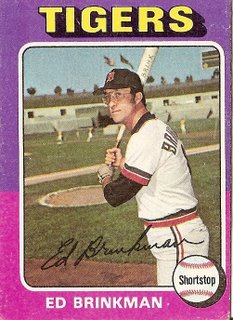"Shocking" Pudge Deal Not So Much, After First Inspection
There I was, sitting in a restaurant, having a nice early dinner out -- giving my wife the night off from cooking during our daughter's band camp week, at which Sharon has been volunteering every day at the high school. Hanging from the ceiling was a television -- its volume down but the closed captions running along the bottom of the screen. Channel 7's guy was on -- I don't know anyone's names anymore -- and there were the words "Pudge heads for New York" scrolling as the talking head spoke. Not knowing what that meant, it became clear moments later, when Pudge Rodriguez's photo was superimposed on the screen, over the talking head's shoulder. And the words "Pudge traded!" was its caption.
My jaw literally dropped -- so much so that my family asked me what on Earth I was reacting about.
It's also the nature of the big baseball trade that, once the shock dissipates, and once you start thinking rationally, most "shocking" trades aren't all that shocking. In fact, some of them make some pretty damn good sense.
It was revealed yesterday, in the wake of Rodriguez's trade to the New York Yankees for reliever Kyle "I Used To Be a Tiger" Farnsworth, that no one in the Tigers' inner sanctum is shocked that Pudge is gone. If only because the team committed, a "couple weeks ago", according to manager Jim Leyland, to the notion that Rodriguez would not be a Tiger in 2009. Pudge's multi-year deal is in its last year, and the cost to bring him back would likely have been quite high, even as he approaches his 37th birthday.
Going further, GM Dave Dombrowski said that Brandon Inge has been tabbed as the new everyday catcher, starting immediately, and extending into next season, at least. That decision, also, was made quite some time ago. So, no shock in the executive offices when the team was able to consummate a deal for Pudge.
So the more I thought about it, the more I can understand the Tigers' perspective. The bullpen is in dire need of help. Farnsworth provides that. Leyland said it best.
"No disrespect to Brandon or Pudge, but whether we make the playoffs isn't going to be decided by who the catcher is," he told FSN Detroit before yesterday's game. "Pitching will decide that," he added.
Indeed.
That much was once again placed into an evidence bag last night.
Closer-for-now Fernando Rodney got all Todd Jones-ish and surrendered a game-tying home run in the bottom of the 9th to Kelly "Babe Ruth" Shoppach, who had himself one of those nights that his children's children will be hearing about, ad nauseam: five hits, all for extra bases, including two home runs. And another late-inning lead, one that the Tigers worked so hard to grab, had vanished in an instant. As if Leyland (and we) needed another case study as to why bullpen reinforcements are so badly required.
If the price to nab at least some of that help comes at the cost of an expensive catcher on the back end of his career and in the last year of his fat contract, then maybe we can all live with that. Pudge Rodriguez was a good Tiger, better than I thought, to be honest. I had some serious reservations in 2005, starting when he showed up to spring training much slimmer and in a nasty mood. He wore a sour puss most of the season, and was widely regarded as being no big fan of manager Alan Trammell. But after Leyland arrived, Rodriguez seemed happier, and he was as big a reason as any why the Tigers made it all the way to the World Series.
Oh, and a word about his coming to Detroit in 2004. Yes, it was a great thing for the franchise, coming on the heels of that 119-loss season. But think back. Despite winning the World Series with Florida in 2003, Rodriguez was 31 and with recent history of back trouble. He didn't have all that many suitors lining up for his services. The Cubs were mentioned. The Marlins showed lukewarm interest. The Orioles came up in discussion. But no team was remotely as desperate -- or as willing to overpay -- as the Tigers were. They needed Rodriguez, for sure, but he didn't have too many other options, either. Not trying to splatter on him, just wanting to set the record straight -- because you'll be reading constantly about how Rodriguez rode into Detroit like a knight in shining armor. You won't read as much, me thinks, about how few teams needed such a knight -- at the cost the Tigers were willing to pay.
But that's not taking anything away from Rodriguez's time in Detroit. It was properly mentioned that not once did he spend any time on the DL during his 4+ seasons here. For a 30+ catcher with a supposed bad back, that's something. And he pretty much maintained a .300 BA and played above average defense. There aren't too many everyday catchers who can do both those things.
This was, at first glance, a shocking deal. Not so much, once you think about it. Pudge will be missed, but as Leyland said -- the catcher isn't going to determine whether the Tigers make the playoffs. Those throwing to the catcher will determine that.














 Proud Member of DIBS
Proud Member of DIBS
